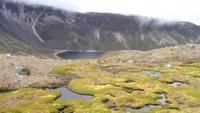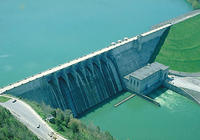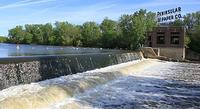-
Site of proposed Los Angeles skyscrapers may contain active seismic fault
Officials at New York-based Millennium Partners have agreed to dig a trench on a site proposed for two towers, thirty-nine and thirty-five stories tall, flanking the iconic Capitol Records building in Los Angeles. Opponents of the project say there is an active seismic fault under the planned location for the two towers, and the developer says the trench will allow geologists to see whether or not it would be safe to build the towers on the proposed site. Critics say that a panel of neutral experts, led by state officials, should do the geological investigation.
-
-
Better approach toward projecting, planning for rising sea levels on a warmer Earth
More useful projections of sea level are possible despite substantial uncertainty about the future behavior of massive ice sheets, according to Princeton University researchers. The researchers present a probabilistic assessment of the Antarctic contribution to twenty-first century sea-level change. Their methodology folds observed changes and models of different complexity into unified projections that can be updated with new information. This approach provides a consistent means to integrate the potential contribution of both continental ice sheets — Greenland and Antarctica — into sea-level rise projections.
-
-
Bolstering national grid resilience as extreme weather events intensify
Between 2003 and 2012, an estimated 679 widespread power outages in the United States occurred due to severe weather. A recent Congressional Research Service study estimates the inflation-adjusted cost of weather-related outages at $25 to $70 billion annually. A new White House report says that grid resilience is increasingly important as climate change increases the frequency and intensity of severe weather.
-
-
Groundwater in Vietnam threatened by a new source of arsenic
In Southern Asia, an estimated 100 million people have been exposed to risks from groundwater contaminated with naturally occurring arsenic. The tainted water, used for drinking, agriculture, and industry, has resulted in a variety of serious health risks, including cancer. “Dig deep” to avoid naturally occurring arsenic contamination has been promoted as an answer to obtaining safe water in South Asia, but arsenic has been found in numerous deep wells drilled in the Mekong Delta region of southern Vietnam.
-
-
A 34-story wooden skyscraper to be built in Stockholm
A Swedish architectural form is building a 34-story wood skyscraper in downtown Stockholm. Solid wood will be the predominant material in the building’s pillars and beams, while inside the apartments, walls, ceilings, fittings and window frames will be also constructed of wood.The firm says that wood is not only cheaper than either steel or concrete, but is also more fire resistant than both. This is due to 15 percent of wood mass being water, which will evaporate before the wood actually burns. In addition, logs get charred which protects the core.
-
-
Aging grid limiting exploitation of wind power potential
Energy firms and utility companies continue to invest in wind power, as evident in the increasing number of wind turbines on the prairies of the Midwest, but the aging infrastructure of the nation’s power grid is limiting the potential of this clean energy source.
-
-
Global warming threatens South American water supply: study

Chile and Argentina may face critical water storage issues due to rain-bearing westerly winds over South America’s Patagonian Ice-Field to moving south as a result of global warming.
-
-
Mapping out an alternative energy future for New York
New York governor Andrew Cuomo will soon decide whether to approve hydraulic fracturing for natural gas in the state. To date, no alternative to expanded gas drilling has been proposed.A new study finds that it is technically and economically feasible to convert New York’s all-purpose energy infrastructure to one powered by wind, water, and sunlight (WWS).
-
-
Making storm warnings more exact, useful
The College of Staten Island (CSI)is the home of one of the most powerful mainframe computer systems in the country, an outgrowth of the City University of New York’s (CUNY) Decade of Science initiative. Following August 2011 Hurricane Irene, CSI scientistsset out to use that computing horsepower to generate scientific data hard enough to make the warnings something more than abstract. They fed millions of data points into the supercomputers, turning an admixture of geology, oceanography, climatology, and land surveys into a set of highly specific projections. Then, on 25 October 2012, Superstorm Sandy hit, and the actual water surges could be measured against the surge projections of the CSI model. On street after street, the computer model predicted flooding to within a foot of the actual surges.
-
-
Testing feasibility of deep geological storage of CO2 emissions
An injection of carbon dioxide, or CO2, has begun at a site in southeastern Washington to test deep geologic storage. Researchers are injecting 1,000 tons of CO2 one-half mile underground to see whether the greenhouse gas can be stored safely and permanently in ancient basalt flows. The United States and portions of Canada have enough potential capacity in geologic formations to store as much as 900 years of CO2 emissions.
-
-
Climate change threatens world food security
The last few decades have witnessed a substantial decline in the number of hungry people worldwide. Since 2007, however, progress has slowed and world food supply and demand have been precariously balanced — climate change threatens to tip this balance, most dramatically in the poorer areas of the world.
-
-
Water reservoirs for hydroelectric dams are sources of greenhouse gas emissions

The large reservoirs of water behind the world’s 50,000 large dams are a known source of methane. Like carbon dioxide, methane is one of the greenhouse gases which trap heat near Earth’s surface and contribute to global warming. Methane, however, has a warming effect twenty-five times more powerful than carbon dioxide. The methane comes from organic matter in the sediments that accumulate behind dams.
-
-
Dams play an important role in water pollution control

Small dams, reservoirs and ponds trap water pollution, which provides an important benefit to water resources. This is especially relevant in agricultural lands of the Midwest U.S., where there are lots of small, but aging, dams.
-
-
Climate change may fuel extreme wildfires
Climate change may be fueling the larger and more destructive wildfires which are scorching vast areas of the American West, according to new research. August 2012 saw 3.6 million acres burn in the region, the most of any August since 2000. There were, however, only 6,948 fires in August 2012 — the second fewest in that 12-year timeframe — meaning the fires were much larger.
-
-
Bacteria to clean contaminated leftover water used in fracking

Fracking is a drilling technique which uses lots of water — up to 5-7 million gallons per frack. One well may be fracked several times. The water goes in clean and comes out contaminated with organic substances that render it unfit for reuse. Purifying that water would reduce the pressure on waste disposal sites called injection wells, as well as on sites of wastewater spills. Researchers say that bacteria may someday clean leftover frack water.
-
- All
- Regional
- Water
- Biometrics
- Borders/Immig
- Business
- Cybersecurity
- Detection
- Disasters
- Government
- Infrastructure
- International
- Public health
- Public Safety
- Communication interoperabillity
- Emergency services
- Emergency medical services
- Fire
- First response
- IEDs
- Law Enforcement
- Law Enforcement Technology
- Military technology
- Nonlethal weapons
- Nuclear weapons
- Personal protection equipment
- Police
- Notification /alert systems
- Situational awareness
- Weapons systems
- Sci-Tech
- Sector Reports
- Surveillance
- Transportation
Advertising & Marketing: advertise@newswirepubs.com
Editorial: editor@newswirepubs.com
General: info@newswirepubs.com
2010-2011 © News Wire Publications, LLC News Wire Publications, LLC
220 Old Country Road | Suite 200 | Mineola | New York | 11501
Permissions and Policies
Editorial: editor@newswirepubs.com
General: info@newswirepubs.com
2010-2011 © News Wire Publications, LLC News Wire Publications, LLC
220 Old Country Road | Suite 200 | Mineola | New York | 11501
Permissions and Policies
